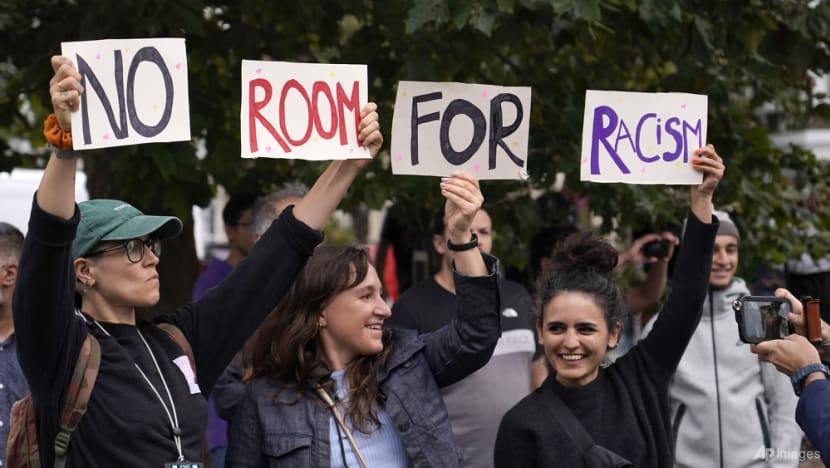Lessons for Singapore from recent riots in UK fuelled by misinformation
Like Britain, Singapore is an immigrant society – home to people of different ethnicities and religions, and a melting pot of cultures.

Protesters demonstrate against a planned far-right anti-immigration protest in London, Wednesday, Aug. 7, 2024 .(AP Photo/Alberto Pezzali)(AP Photo/Alberto Pezzali)

This audio is generated by an AI tool.
The fatal stabbing of three children at a dance workshop in the northern English town of Southport sparked the United Kingdom’s worst riots in more than a decade.
The violence was fuelled by misinformation circulating on social media that included false claims about the suspect’s identity, religion and immigration status.
Observers say lessons from the unrest – from the causes to the consequences – cannot be ignored by Singapore.
Law and Home Affairs Minister K Shanmugam on Wednesday (Aug 28) said that if riots can happen in the UK, which is amongst the best-governed countries in the world, they can happen anywhere – including Singapore.
Factors like weak law enforcement, allowing hate speech, and poor immigration control can lead to lawlessness and instability, Mr Shanmugam said during a fireside chat at an event on dispute resolution.
“Free speech doesn't mean you're allowed to say false things which lead to loss of lives,” he emphasised.
The minister added that laws in Singapore that disallow protests, target fake news and foreign interference, are part of a framework that prevents riots from breaking out.
He said that such laws have led to high public trust in the country’s enforcement agencies.
“We have tough laws, but they are within an acceptable framework. You need a lot of government action, positive action, to create an environment which brings people together,” he said.
RACIAL AND RELIGIOUS HARMONY
Like Britain, Singapore is an immigrant society – home to people of different ethnicities and religions, and a melting pot of cultures.
After being subject to racial violence in the 1960s, the country's early leaders recognised that multiculturalism needed to form a critical part of its identity.
The importance of diversity is nurtured from young, with schools celebrating events like Racial Harmony Day.
People who buy public flats must also adhere to the Ethnic Integration Policy, which ensures each neighbourhood houses a mix of races.
“These are clear policies which signal to individuals that this country cares a lot about multiculturalism … and living with diversity,” said Dr Mathew Mathews, a principal research fellow at the Institute of Policy Studies (IPS).
Singapore complements these policies with punitive measures.
For instance, it is a crime to cause ill-will among religious groups, and to discriminate on the basis of race when hiring at the workplace.
To prevent mass protests like those seen in the UK, public demonstrators must apply for and receive a police permit. These must be held at the Speakers' Corner, the designated venue for such events.
But even within that space, there are limits – issues relating to race and religion remain prohibited.
“We do have a system in Singapore that people recognise that protests over sensitive issues, differences based on our racial and religious backgrounds or a migrant status … mobilisation based on those ideas are just not acceptable,” said Dr Mathews.
Experts said it all comes down to how a people derive their national identity – one that is not based on appearance or place of birth, but by common ideals like multiculturalism or meritocracy.
BATTLING MISINFORMATION ONLINE
Singapore is not insusceptible to the misuse of social media and online misinformation campaigns, experts said.
Hence, there are laws that enable the authorities to direct social media firms to prevent access to harmful content.
Such content includes posts that contain sexual violence, terrorism, and those that may affect racial and religious harmony.
Social media companies must also follow a set of guidelines to better online safety and prevent the spread of harmful content on their platforms.
There is also the Protection from Online Falsehoods and Manipulation Act (POFMA), Singapore's version of a fake news law, which allows the government to point out and clarify falsehoods.
Dr Carol Soon, a principal research fellow at IPS, said while such measures act as a deterrence, bad actors will continue to find new ways to circumvent the law.
One area of particular concern is the rapid advances in generative artificial intelligence, he said.
“AI technology (is) being used to produce deepfakes and cheapfakes, which have an implication on people's perception of reality,” Dr Soon noted, pointing to recent deepfake videos of politicians and celebrities on social media.
Singapore is considering specific ways to tackle AI-generated misinformation, including a temporary ban on deepfakes, particularly as the general election draws closer.
But experts believe more can also be done to tackle the issue higher upstream.
Dr Soon said policymakers could work closely with academics and organisations to identify emerging threats and develop preemptive measures.
The Centre for Advanced Technologies in Online Safety, a platform for Singapore’s community of research partners, companies and practitioners to build capabilities for a safer internet, was recently launched.
“Through that centre, funding support will be given … to develop solutions … that can detect and counter the spread of online harms, including misinformation,” Dr Soon said.
He suggested there is also a role for the local mainstream media by avoiding political polarisation seen in other countries.
The media in Singapore remains a trusted source of information. According to the Reuters Institute, trust in Singapore's media has risen from 43 per cent in 2022 to 47 per cent this year, putting it in third place in the Asia Pacific.
BATTLING EXTREME VIEWS
Singapore has also not been spared from radical ideology, brought on by the pervasiveness of the internet.
Two cases in recent years were linked to far-right extremism, involving teenagers who plotted to carry out attacks.
Both cases were dealt with under the Internal Security Act, which empowers the authorities to detain those who pose a threat to security or public safety.
There are other measures. Laws exist to counter hostile information campaigns if foreign actors attempt to sow discord in Singapore's communities.
In such cases, the authorities can direct internet entities to help in investigations, take down content or suspend accounts.
When it comes to political discourse, experts said parliament has proven to be a useful, moderating platform, especially when discussing foreign talent policies.
“It is important that debates are conducted constructively in a way that is respectful, that comes up with potential solutions that are actionable, implementable, in the context of our globalised, diverse, multicultural society,” said Dr Kumar Ramakrishna, dean of the S. Rajaratnam School of International Studies.
He noted that in the age of digital media, misinformation or malicious content cannot be avoided.
Aside from law enforcement, educating the general public and building individual and community resilience are also crucial, he said.
"It is important to ... develop critical thinking and digital literacy, to understand best practices in knowing how to evaluate what one reads or views online,” Dr Ramakrishna said.
“(We) can't run away from social media because it’s very much part of our world. (We) have to engage in a way which is smart and constructive, being aware of the potential pitfalls and avoiding echo chambers.”
















